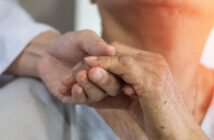Dr Sam Murphy, Lecturer in health studies and Interim Assistant Head of Department, in the Faculty of Health and Social Care writes on the controversial subject of assisted suicide…
The recent BBC programme How to Die: Simon’s Choice brought to the fore the dilemmas that arise following a diagnosis of a terminal illness such as Motor Neurone Disease (MND).
For some facing the diagnosis of terminal illness the choice may well be around what type of death they want and, in this particular case, the timing of it.
This is pertinent. As the UK does not allow assisted suicide (or dying), it may be the case – as evidenced in a Terry Pratchett documentary filmed in 2011 that people may “go” before they are ready as the person needs to be well enough to travel to Switzerland.
Often the debates focus on the rights of the person who wants to end their own life. But How to Die brought into stark relief the issues that are faced by the ill person’s family. What rights do they have? Should they have the right to stop a person choosing assisted suicide given that they are the people who have to live with the consequences?
We talk around assisted dying about right to end your own life. One person’s rights ends up being another person’s constraints.
You can say “I want to take my own life”, but the person, the loved one, relative or close friend has to face a life without the person they wanted by their side. Couldn’t you argue that it is a right to have a husband who lives alongside you? It is really hard. I think the documentary is balanced and gives both sides of that argument. Also it looks at what happens afterwards and the people left behind. It focuses on the decision-making process and the journey to Switzerland that Simon makes.
It is a complicated moral maze. After all, we don’t know how difficult life can really be, unless we have lived in someone’s shoes. The documentary, which is worth watching, considers these questions.
The other side of the argument of course is that sometimes vulnerable people might be talked into taking their own life, if they have assets for example. Or perhaps someone might be scared of being a burden and choose assisted suicide rather than because they are terminally ill.
It is very difficult, there is always a moral dilemma with many unanswered questions. Because the person involved has made the decision rather than allowed nature to take its course.
As for the bereavement aspect, this is difficult to deal with in any circumstance – even when the death is timely and unexpected. For the people bereaved by assisted suicide other factors may complicate the grief: could they have looked into other forms of palliative care or supported them for longer? Maybe they did or said something that encouraged the person to commit suicide, or perhaps if they had done things differently that person may have chosen to live rather than end their own lives.
People may question whether those left behind can prepare for bereavement. Yet grieving is very individual thing. A lot depends on timing and age of death and it is very difficult to say whether you can prepare people ahead of your death – I’m not entirely sure you can.
All these issues have been studied by thousands of students who have taken the Faculty of Health and Social Care’s module on Death and Dying (K260). K260 has been running for over 20 years and covers issues such as the meaning of death and rituals around it, end of life care, bereavement and the ethical dilemmas that arise at the end of a person’s life.
I think the documentary is powerful and considers the impact a decision to have assisted suicide has, not just the on the person



